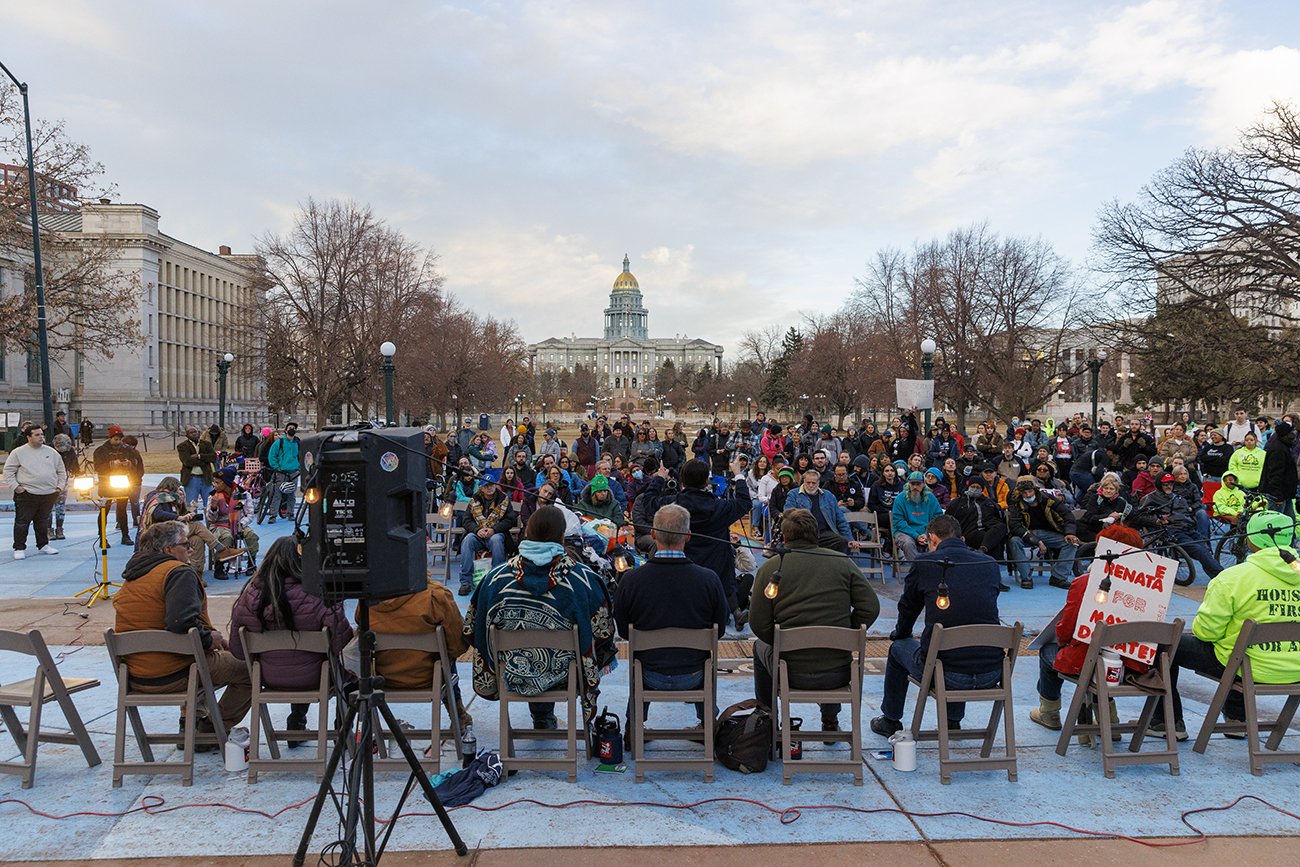A majority of Denver’s unhoused want housing but face several barriers
By Robert Davis
Denver mayoral candidates speak at Feb 20 community forum on homelessness. Photo: Giles Clasen
More than 93% of Denver’s unhoused community wants to move into housing but say barriers, like a lack of financial resources and not having identity documents, are preventing them from doing so, according to a new survey from Housekeys Action Network Denver.
The survey documented the views of nearly 1,000 people experiencing homelessness in the Mile High City and was compiled during interviews, forums, and community meetings. It was released amid a high-profile election season in Denver where housing and homelessness have taken center stage.
“The survey results show that people who live on Denver’s streets overwhelmingly want housing,” Terese Howard, an organizer with HAND, said during a presentation of the survey results on March 8. “But they want housing that actually meets their needs and doesn’t try to force other restrictions on them.”
Homelessness has been a hot topic of debate in Denver for several years. The city’s unsheltered homeless population has increased from 446 in 2016 to more than 2,000 in 2022, which represents a growth rate of about 194%, according to one-night count data from the Metro Denver Homeless Initiative.
In turn, Denver has created multiple programs aimed at getting people off the streets and connecting them with shelters or services. For example, the city dedicated more than $120 million of the funds it received under the American Rescue Plan Act to address affordable housing and homelessness. With that money, Denver opened two overnight shelters and purchased two hotels to convert into temporary housing units for people exiting homelessness.
Denver also pioneered programs like the Street Enforcement Team, a civilian-led group that works under the direction of the Department of Public Safety to enforce the city’s quality of life ordinances like the urban camping ban. It also invested $2 million to fund the Denver Basic Income Project, a guaranteed income initiative that pays people experiencing homelessness up to $12,000 per year with no strings attached.
However, some mayoral candidates say the city’s efforts have been unsuccessful even though Denver’s overall homeless population has declined by about 16% since 2016, according to federal data. Candidates like Chris Hansen, Andy Rougeot, and Kelly Brough have all said they would arrest unhoused people who refuse to enter treatment or services after being contacted by social workers or police officers.
The survey results suggest that many of Denver’s unhoused are turning down services because they’ve lost faith in the programs. For example, respondents reported waiting an average of 2.4 years before they were moved off a waitlist and into a housing unit. Another 50% reported not knowing what a housing voucher is or how to enroll in programs to access them. Others said housing options were too far from basic necessities like jobs and doctor’s offices.
“It really dispels the myth that’s spreading during this campaign that people are sleeping on the streets because they don’t want housing,” an individual identified as ‘V,’ an organizer with HAND, said during the presentation.
Many respondents also said that some of the barriers they face didn’t end once they entered housing. For instance, 63% of respondents said financial assistance was their biggest barrier to staying in a housing program after being placed. Another 24% of respondents added that there are not enough mental health support services provided by housing programs.
Going forward, the report asks state and local lawmakers to prioritize building affordable homes for people who can afford to pay between $600 and $1000 per month for rent. It also asks for city officials to increase the number of social workers who can connect people experiencing homelessness with services and end the use of criminal background checks on housing applications.
If we are working to “end homelessness,” as is so openly stated, this work must be directed by houseless people themselves,” the report states. “Lived experience offers an inmate understanding and ability to identify current and foreseeable obstacles that perpetuate this ever-pressing issue.”

